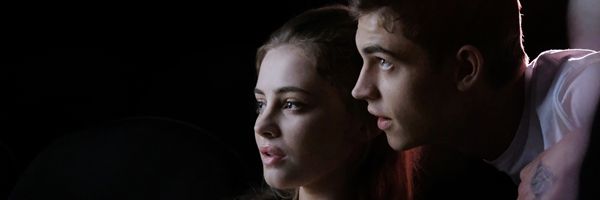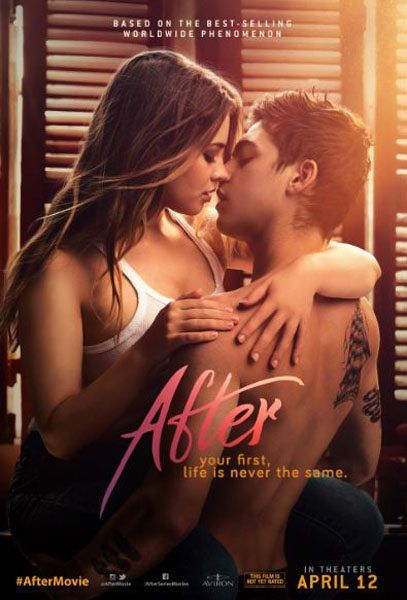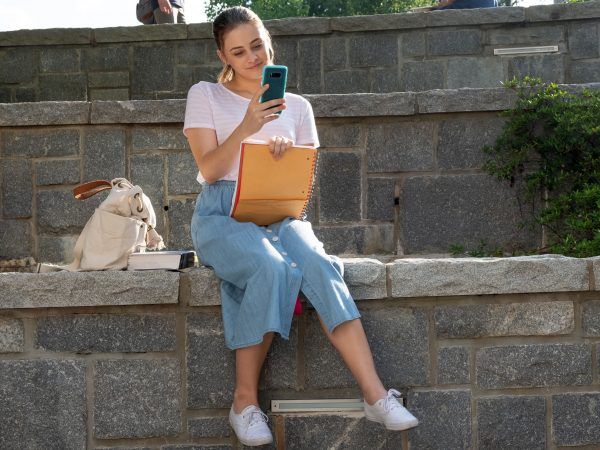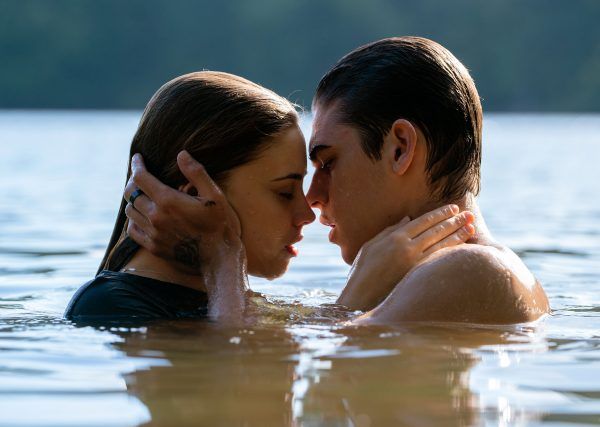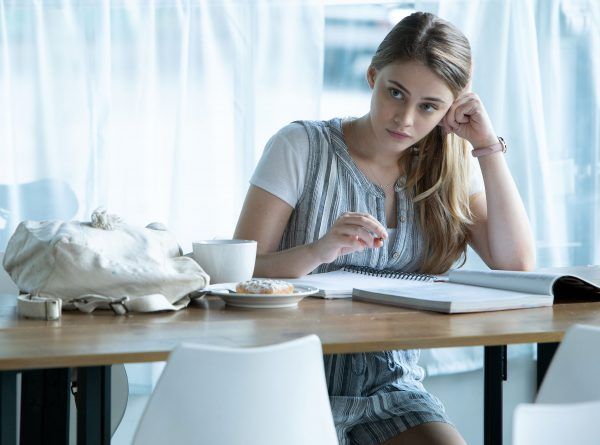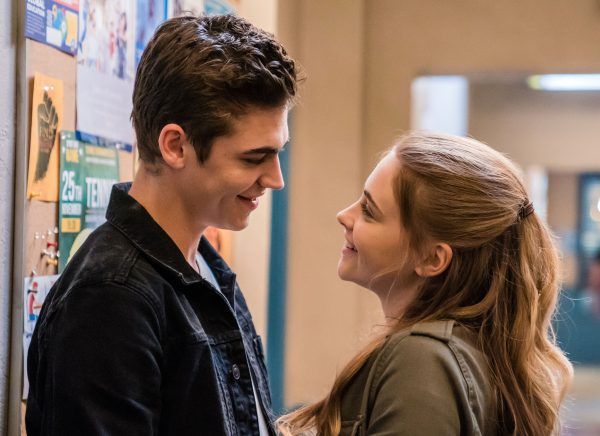Directed by Jenny Gage and based on the hugely popular book by Anna Todd, the romantic drama After follows Tessa Young (Josephine Langford), who embarks on her first year of college as a dedicated student and dutiful daughter, until her roommate convinces her to experience the social side of college. After a game of truth or dare leads to a rejection that intrigues mysterious British import Hardin Scott (Hero Fiennes Tiffin), the two learn that they have more in common than they ever would have imagined, but at the same time, the secret that Hardin is hiding could tear any chance they have at real love apart.
At the film’s Los Angeles press day, Collider got the opportunity to sit down and chat 1-on-1 with Aussie actress Josephine Langford about how she ended up playing Tessa after originally auditioning for another role, how she connected with her character, what she found challenging about the role, shooting the lake scene, having Selma Blair play her mother, the importance of Tessa making her own decisions in life and love, whether she’d be as forgiving as her character, the most fun and the most challenging days on set, what lead her to being an actor, and the TV series that she’d love to do a guest spot on.
Collider: You originally auditioned for a different character, so how did you actually end up playing Tessa?
JOSEPHINE LANGFORD: So, my friends were auditioning, and I was like, “What’s this?” I was rooting for my friends, but I was like, “What’s this tape that we’re about to do?” And they were like, “Oh, it’s just this thing. You can’t audition for it ‘cause you need a green card and it conflicts with a job that you’re shooting.” And it did, so I didn’t get the audition. Two months later, they had pushed back the shooting dates and had cast Tessa, but I got the audition for Molly ‘cause I was suddenly available when they pushed back the shooting dates. This was one of the only auditions I’ve ever done, where I didn’t read the script beforehand ‘cause I literally didn’t have time that week. So, I did the audition and I did a callback, and then I got a call saying, “They want you for the main girl.” Then, I read the script and was like, “Oh, yeah, that seems like a better feel.”
So, you clearly hadn’t been familiar with the books.
LANGFORD: I didn’t know about the books. When my friends were auditioning for it, they were like, “Yeah, apparently this is based on a successful book series.”
And then, you find out just how insanely successful this book series is?
LANGFORD: It is, and that happens a lot with auditions. You’ll read something, and it has two A-listers in it. You’ll read something else, and it’s got a huge fan base. There are so many projects out there, which have so many things about them that are successful, that it’s sometimes difficult to realize which ones are gonna blow up.
What was it about Tessa that you ultimately felt most connected with?
LANGFORD: With every character that I’ve ever played, I felt like I just understood the way that she thought and how she was. We have a lot of little things in common. I read it and was scared about someone playing her as a caricature because I knew that it was so possible for someone to do the role as an uptight, conservative, one-dimensional girl. I was like, “I wanna play her because I wanna get it right.”
What did you feel most challenged by, with Tessa?
LANGFORD: I had to do an accent for the role, but I didn’t have to do crazy mannerisms. For me, the challenging thing was the behind-the-scenes stuff of filming, being in literally every scene, managing emotional continuity, and dealing with scheduling and shooting everything out of order. I’ve never had to deal with that before, so I found that most challenging about shooting the film.
How did you find the accent?
LANGFORD: I’ve been practicing American accents for years, and I’ve done it in a few different roles, so I was pretty confident with it. It was fine.
The lake scene between Tessa and Hardin is really beautiful to look at, and it seems like something that would sound like a lot of fun on paper, but actually doing it seems like it might have been a bit challenging. What was that like to shoot?
LANGFORD: That was one of the best scenes, and one of the worst scenes. We shot for three days, at the lake. There was a day when we had a thunderstorm, and every 30 minutes, we had to get out of the water and move to base camp. It was a nightmare. Then, there was a moment where it got really cold, and we were standing on the dock, freezing and trying to control the shivering. That wasn’t good. There was a moment where it was really hot and we got to jump in and swim around, which was great. That was really fun. But, there were definitely challenges to shooting there.
When I watched that moment, I wondered if you were able to get through the dialogue without choking on water, and I wondered if you were ever concerned about what was in that water.
LANGFORD: When we were kissing, it was so funny because there must be so many takes where we were just bobbing in and out of the water. I couldn’t stop laughing because we were swallowing water and trying to do this romantic kissing scene. And we had a snake wrangler there because there were some snakes in the lake. I’m from Australia, so I’m [used to that].
How was it to have Selma Blair playing your mother?
LANGFORD: She’s amazing! She’s so hilarious. She’s so strong. She’s just so great. We have so much in common that it was quite hilarious that we were cast as mother and daughter because we even walk in the same way. It just really felt quite apt. She’s just so funny. We would walk into a room to do a scene, and right before we’d walk in, she’d scream out something like, “Mangos!” And then, we were all trying to control our laughter, as we were doing the scene, but she’d be fine because she’s just a pro.
I actually thought it was a smart decision to soften Hardin a bit in the film. He comes across as much more of a dick in the book.
LANGFORD: Well, when you have 600 pages to talk about a character and to describe a character, it’s different than having an hour and half on film. You have to adapt some things, otherwise it doesn’t work. We only have a few scenes for the audience to see how he is. There are always little things that you have to change to adapt something to a film. If we’re lucky enough to have more films, and to adapt the second and third and fourth book, there’s definitely gonna be more of their complicated relationship. They argue a lot, and that’s something that we’re trying to bring to the other movies. It’s just difficult to write that in, when you have four minutes on screen to do an argument scene and for it to be resolved. It’s so much harder than when you have a hundred pages in the book. So, there are elements to the relationship that are definitely gonna be shown more in the following films, if we have following films. For this film, it was just so important that we focus on establishing the relationship first, before we go into the complications of the relationship.
It’s great that Tessa makes all of her own choices, throughout the film, and she voices what she wants and what she doesn’t want.
LANGFORD: She does what she wants, according to her own comfort levels.
Was that something that was always in the script, or was that talked about, along the way?
LANGFORD: It was always in the script, and I think it was always in the book. There were little revisions that Jenny Gage made to the script, which were fantastic, but it’s always been a part of the book, too. Tessa does what she wants, according to her own comfort levels. When her mum is like, “Don’t get with this boy,” she doesn’t listen to it. When people are like, “You haven’t had sex yet, you should,” she doesn’t listen to it. She does what she wants, and it’s not about what other people around her want her to do. She’s in control of her own sexuality, and that’s something that’s always been a part of the books, and something that’s been really important about them. She’s open to new experiences, and she’s curious and wants to try things. She’s never pressured by Hardin into doing anything, and she doesn’t allow herself to be, by other people.
Do you feel like, if you were in Tessa’s situation, that you would be as forgiving as she is, or do you think you’d react differently than she does?
LANGFORD: The honest answer is that I don’t know. Love is a very strong emotion, and a very powerful emotion. I don’t think you can predict what you would do, in those situations. I’ve had friends who say that they would never forgive cheating, but then they fall in love, the guy cheats, and they forgive him. I don’t know what I would do.
Did you have a most fun day on set, and was there a most challenging day?
LANGFORD: The most challenging day was a highly emotional scene that happens towards the end of the film. I don’t want to specifically say what, but it was shot over the course of 16 hours. It was just one scene, from a million different angles, and doing that scene on repeat, for 16 hours, was hard. I struggled with that. As for the most fun scene, everything with Selma probably was the best. I also found the montage stuff really fun because you can talk, but they’re not recording what you’re saying, so you can just do anything.
You had a lot of women involved in this production, from the director to the author to the producers, and the cast is made up of a very diverse, interesting group of actors.
LANGFORD: Everyone thought it was really important, and really tried to make sure that there was diversity in the cast. You can always strive for more. It’s something that doesn’t happen enough in the industry, but everyone thought it was just so important that we have people with different sexual orientations, different races and different ages, so that everyone has someone that they can relate to. If you’re making a film, the people in it have to look like and represent what people in the real world look like. They just do. Not doing that doesn’t make any sense. It’s just stupid.
Because you came onto this so late, did you have a moment when you finally got together with everybody and things felt like they really clicked?
LANGFORD: Except for Hero [Fiennes Tiffin], every single person on this was cast on very short notice. A few of the characters were cast the day before they showed up on set. So, it was probably mid-way through, or towards the end of filming, when everyone had finally been cast and we all got to hang out, where we were like, “Okay, this is it.” That’s just the reality of making a film. Sometimes you show up and it’s like, “This is the guy you’re kissing,” and you do the scene.
When you take on something like this, where it’s such a big leading role and a character that a lot of people love, from a book series that’s very loved, was it something that you felt really ready for, or is it something that you really learned a lot from?
LANGFORD: I don’t know. For me, I just read the script and was like, “This is the role that I’m doing,” and I showed up to set and did it. I didn’t think too much about everything else. What I learned on this was that I really enjoy this process, and love it. I’m so happy that I have the privilege to do this, as a career. That’s the thing that I learned. Some set experiences are not good, and sometimes the auditioning process is not fun. There are a lot of different things about this industry that can just make you not enjoy it. And so, when you have an experience, and it’s really good, and you’re in a role that you like, with people who are wonderful, it gives you that boost and makes you go, “This is why I’m doing it.” It supersedes all of those moments, where it doesn’t feel rewarding.
A lot of kids say they want to be an actor, just like they say they want to be an astronaut, a fireman, or a veterinarian. How did you decide to take that step to try to make it happen, for real?
LANGFORD: I always knew that I was gonna be an actor, and that I wanted to be an actor, because there was nothing else, where I was like, “I wanna do that for a living.” I grew up in a very isolated, small city that’s not incredibly industry heavy. We only have four agents, in the whole city, so it took me awhile to figure out what an agent was and how the industry works. It was just a really slow process of learning how things work and how to get into the industry.
Did it also help that your sister, Katherine, was going through it, as well, or did you take very different paths?
LANGFORD: We have taken different paths. The way I got a U.S. agent was through someone who introduced me to them, and she got her U.S. agent through a workshop. We had very different paths to figuring out, breaking into, and getting into the industry.
Do you know what you’re going to do next, or have you thought about what you want to do next?
LANGFORD: There are a few projects that I’ve read recently, that I love. I’m still in the process of meeting for them, so I don’t have anything locked and loaded. I have a few things floating around.
When you read something, do you instinctually know whether something is just not for you?
LANGFORD: I pass on a lot of stuff. There’s some stuff that I read, that I just don’t feel any connection to it, but someone else might. It’s an incredibly personal, subjective thing, and that the same with the stuff that I’m passionate about. It’s not a genre. It’s not a character. You read something and there’s just something inexplicable about it that makes you wanna do it.
Are you looking at film and TV projects?
LANGFORD: Yeah, I am. With TV, you just have to be extra careful that it’s something that you really love ‘cause it’s obviously a longer contract. But for sure, I’m interested in both.
Is there a current TV show that you love that you’d love to do a guest spot or arc on?
LANGFORD: There are so many. I can’t pick, so I’m just gonna go with the last thing I watched, which was Sex Education on Netflix. That was wonderful, and I think it would be really fun to have a cameo on that. I would love to do guest spots. That just sounds really fun.
After is now playing in theaters.

